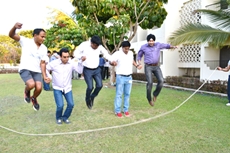Leadership lessons from the giant skip
25 May 2016
 The activity we were running was an innocuous one. We call it the Giant Skip. The activity involved a group of 20 people having to skip through a rope that would continuously be in motion by two other members of the team.
The activity we were running was an innocuous one. We call it the Giant Skip. The activity involved a group of 20 people having to skip through a rope that would continuously be in motion by two other members of the team.
The catch in this activity being that – if the rope were to touch any part of anybody's body while doing this activity – the whole team would need to start from the beginning again.
As easy as the activity seems – it is actually challenging. The activity calls for the entire team to be well co-ordinated while doing this activity, failing which they would keep tripping up and have to repeat the same.
The team that came to us had a very dominant leader. The sort who always liked to ''tell'' what needs to be done. Having worked with the team before, we knew the leader quite well. So, just before his team attempted this challenge, I walked up to the leader and put in a word: ''I know you would like to jump in and direct this activity, but can I request you to hold back for a while – and let's see how your team does''.
 The activity started with a lot of buzz and excitement. As the leader stayed back as advised and watched from a short distance, the team debated how to crack the challenge. Then the attempts started…… once, twice, three times…… every time they almost succeeded, someone would trip up and the team would have to repeat the whole activity again. Meanwhile, standing besides us – we could sense the frustration slowly building within the leader.
The activity started with a lot of buzz and excitement. As the leader stayed back as advised and watched from a short distance, the team debated how to crack the challenge. Then the attempts started…… once, twice, three times…… every time they almost succeeded, someone would trip up and the team would have to repeat the whole activity again. Meanwhile, standing besides us – we could sense the frustration slowly building within the leader.
And then it happened….. before we knew it – he shot out into the open and stood besides his team. ''Listen to me guys'', he almost barked! ''Get one behind the other in one straight line'', he ordered. ''But….'' Someone tried to add an opinion. ''Don't argue – just do what I tell you to do'' he snapped. In a matter of seconds, the playful mood in the group turned somber. ''ok – watch the rope carefully and go after every alternate rotation'' he ordered, quite oblivious to the mood in the group. Almost silently, the team went one after the other….. and voila! the team did succeed. A broad grin broke out on the face of the leader – his team had ''succeeded'' afterall!
Winning without feeling the joy of victory
We then called the team together for a quick debrief under the canopy of the trees. ''Congratulations guys – you succeeded! Give yourself a round of applause''. There were weak smiles all around and some half hearted clapping. Somehow, it did not feel like a victory to them.
We then chatted about the whole flow of events – how things unfolded, what mistakes they made, who took the initiatives, who came out with the ideas….. and yes, what happened when the leader barged in. That last question was met with silence. We prodded on: ''How did you guys feel when the leader barged in and took control?''. Silence again till finally, one other senior leader piped up, ''It did not feel so good actually''. ''Why so?'', we pushed on with curiousity. ''Because somehow the whole fun activity suddenly transformed into a task that was to be done. And we could not even share our opinions. We succeeded, but the fun in the activity just drained out''. Many others nodded in agreement.
Here was a critical learning moment. We turned to the leader and asked him, ''So what happened – why did you have to jump in?''. Credit to the leader, he immediately saw what had happened and appreciated it instead of getting defensive. He broke out into a sheepish smile. ''You know, I had told myself not to jump in. However, the minute I saw the team struggling, I just could not hold myself. I felt the way they were attempting the challenge – they would keep failing and so I had to intervene''.
Leadership: teaching the team how to fish
''Was that the best thing you could have done? What if you had not jumped in – do you think this team was capable of finding a way to succeed?'' we asked. ''I guess so – it is not rocket science after all'' he grinned.
The rest of the discussion hovered around his dominant, autocratic style of leadership – and the excuse of play, gave the team an opportunity to open up and share their honest feedback with him.
Two years down the line, I heard, the leader, obviously having worked on much of that feedback, was rated a far better leader by his team.
The insight from this simple activity is profound for perceptive leaders. The easiest thing for you to do as a leader is to ''tell and direct'' people on what to do. The minute your team is stuttering, the temptation to jump in and ''do it yourself'' is immense.
But much like parents who watch with their hearts in their mouth, as their toddlers tumble and stumble, but finally get walking by themselves – leaders need to know when to let go. And when it is ok to let their team fail and find their feet again. They need to know that their job as a leader is to teach their team, ''How to fish'' and not do the fishing for them.
Think about it - as a leader, what kind of a team would you want to have? One which is completely dependent on you for all its key decisions or one that is pretty much independent and can do without you?
The wise Chinese sage Lao Tzu put it succinctly: A leader is best when people barely know he exists. When his work is done, his aim fulfilled, they will say: we did it ourselves.


















